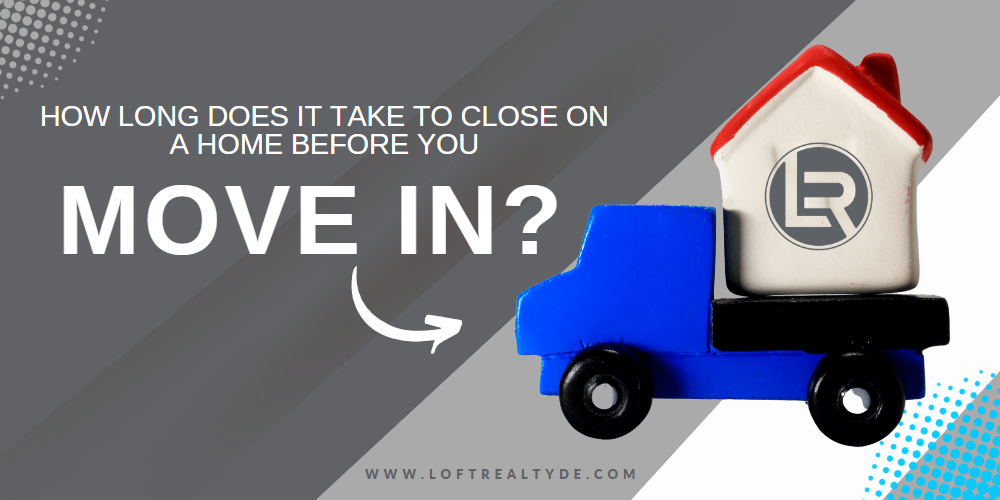How Long Does It Take To Close On A Home Before You Move In?

As a home buyer, it can be hard to wait for closing, especially if you're trying to close on a house and want to move or need the savings that a refinance would give you.
For most of the closing process, you must wait on other people, and you often don't know how far along they are on what you need them to do. The underwriter should look at your file. Has your employer answered the phone when the underwriter called to check on your job? Why does it take the appraiser so long to figure out how much the house is worth?
Even though you can't change how long the closing process takes or why it takes so long, knowing how long it takes and why it takes so long may make the wait less painful.
Total Time to Close For All-Cash Buyers
When you pay cash for a house, the closing process may be much faster than when you get a mortgage. It’s because you don't have to go through underwriting, an appraisal, and a three-day wait for the mortgage closing disclosure.
Even though you don't have to get title insurance or a home inspection, it would be irresponsible not to. You could finish a cash-only deal in a couple of days. You only need to move money, make the change of ownership official, and get the keys.
Total Time to Close For Mortgage Buyers
When a mortgage is involved, the closing time usually goes up to 30 to 60 days. Getting a mortgage to buy a home is usually faster than getting a mortgage to refinance a home. Because it costs more to close a deal late, everyone is more motivated to work quickly and keep the process moving forward. If the closing is late, it could mess up the seller's plans or leave the buyer without a place to live, among other problems.
How long it takes to close also depends on the type of mortgage. Government-backed loans take more time to finish than regular loans. How long it takes to close on a mortgage depends greatly on how the market is doing. Also, the pandemic affected the days needed to close a home.
Here are the types of loans and the different days to close depending on the type of loan:
Type of Loan |
Pre-Pandemic (Before 2020) |
Post Pandemic (After 2021) |
Conventional Loan |
45 Days to Close |
47 Days to Close |
FHA Loan |
47 Days to Close |
50 Days to Close |
VA Loan |
48 Days to Close |
51 Days to Close |
The pandemic slowed down the closing process because many lenders needed time to train their employees to work from home and change their business plans to include an online application process. Also, loan interest rates were at an all-time low, fueling even more demand.
But some lenders promise closing dates that are much faster than usual. They do this by pre-underwriting your mortgage, which is a more in-depth process than pre-approval.
What could cause the closing of your house to be pushed back?
There are many points in the mortgage process where delays could happen. The closing date could be pushed back because of any of these things.
1. Lenders are overworked.
When there are a lot of mortgage applications, your closing may take longer because the people working on it may be too busy. Setting up an evaluation or home inspection might be hard when these experts are busy. Many people who tried to buy or refinance a home during the pandemic had a similar experience.
2. The home inspector finds things that could kill the deal.
Suppose there are problems with the house that are found during the inspection. In that case, the inspector may delay the closing because the buyer and seller will have to talk more to choose one of the following options:
-
The seller will make repairs before the closing;
-
At closing, the seller will give the buyer a credit that you can use to pay for repairs that need to be done after closing;
-
To make up for the repairs, the selling price will go down;
-
The seller won't do anything, but the buyer will keep going anyway; or
-
Either the buyer or the seller will back out of the deal.
3. It's not clear who owns the land.
Whether you're buying or refinancing, if you get a mortgage, your lender will ask for a title search and make you buy a lender's title insurance policy. You'll also be able to buy owner's title insurance, which experts strongly recommend.
Sometimes, a business that does title searches can quickly fix any problems with the title that might keep you from getting uncontested possession. In other cases, the solution may cause your sale to fall through or delay your closing.
4. The appraisal is too low or shows work needs to be done.
If the house appraisal comes in lower than the purchase price, the deal can't go forward unless the seller lowers the price or the buyer gets a second opinion from another appraiser.
The appraiser will check to see if the house is in good enough shape to meet the loan requirements. If it doesn't meet these requirements, the seller must fix it up, or you'll have to start over with a mortgage for home repairs, like an FHA 203(k) loan.
5. There are changes in your credit report.
And finally, a lot of delays happen because your credit report changes. Don't get a new credit card or loan, and don't add to your credit card balances while you're in the process of closing. These actions could hurt your credit score or debt-to-income ratio (DTI) to the point where you can't get a loan or pay a higher interest rate.
Some Tips to Close A Home Quicker
When you close on a house loan, the only person whose speed you can change is your own. Here are some tips for closing a home quicker:
Prep documents ahead of time.
Keep your tax returns, bank statements, and pay stubs from the last two years. Your lender may ask for more paperwork, but if you know the basics, it will help.
Do not get new credit.
Don't try to get a new credit card, personal loan, car loan, etc., while waiting for your loan to close. If you do this, you are legally responsible for the whole debt. Any new debt you take on will raise your DTI and force you to go through re-underwriting.
Stop job-hopping.
Don't give up when it's time to close. What if another company makes you an offer you can't refuse? Your lender might be able to help you close on time.
Rate-lock time gets longer.
Your lender should tell you how long it usually takes to get a loan. If they say 30 days, lock in your rate for 45 days, even if it costs more, just to be safe.
Try a different mortgage lender.
Switching lenders is bad if you want to close on time because you must do so many steps again. If your lender isn't giving you a good deal, it may be better to leave than take out an expensive loan.
Final Thoughts
Now you have a better idea of how long it takes to close on a home before you can move in. Remember that it varies depending on the loan type and your chosen lender's requirements. What’s important is to be patient, and having this knowledge in mind will keep your expectations in check.
Do you want to close on a home quickly? Then Loft Realty can help you do just that. Feel free to contact us to help you get your dream Delaware home.
Categories
Recent Posts

Top-Rated Hospitals in Delaware

Exciting Events to Heat Up Your Winter in Delaware!

Smarter Home-Buying Decisions

Why Retirees Are Falling in Love with Delaware: Neighborhoods, Communities, and Everything in Between

Best Places to Go Sledding in Delaware

Delaware’s Secret: Reasons Why It’s Not Expensive to Live Here!

5 Best Spots for Last-Minute Holiday Shopping

8 Best Places to Eat at the Rehoboth Beach Boardwalk

The 8 Biggest Mistakes People Make When Moving to Delaware—Here's What You Need to Know

Is Wilmington, Delaware Safe? A Look at Recent Changes in Crime Rates and Community Efforts
GET MORE INFORMATION

